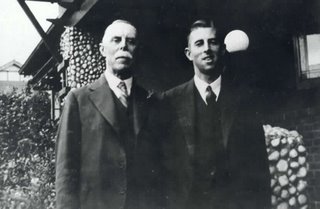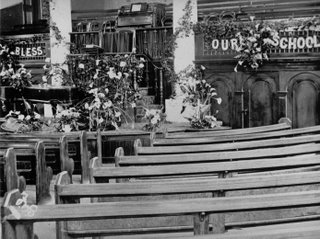 Helen, a regular reader of this site has alerted me to an interesting Boreham angle.
Helen, a regular reader of this site has alerted me to an interesting Boreham angle.In Dr Boreham’s book, ‘The Drums of Dawn’, there is an essay entitled ‘Second Husband’ about a man named Curley. This man, Boreham said, used playing cards as his bible and his calendar.
Helen goes on to write about an old time ‘singing cowboy’, named Tex Ritter, who made a record about an American GI, during WWII, using a deck of cards in chapel for a bible and calendar. The title of the record was ‘Deck of Cards’.
A quick Google search of the Internet has revealed numerous sites (see one below) explaining how one can use playing cards to speak about the Christian message. It also gives information on the singing cowboy’.
One story on this site says that a young soldier was in his bunkhouse all alone one Sunday morning over in Afghanistan. It was quiet that day, the guns and the mortars, and land mines for some reason hadn't made a noise. The young soldier knew it was Sunday, the holiest day of the week. As he was sitting there, he got out an old deck of cards and laid them out across his bunk.
Just then an army sergeant came in and said, "Why aren't you with the rest of the platoon?" The soldier replied, "I thought I would stay behind and spend some time with the Lord." The sergeant said, "Looks like you're going to play cards." The soldier said, "No sir, you see, since we are not allowed to have Bibles or other spiritual books in this country, I've decided to talk to the Lord by studying this deck of cards." The sergeant asked in disbelief, "How will you do that?"
"You see the Ace, sergeant, it reminds that there is only one God.
The Two represents the two parts of the Bible, Old and New Testaments.
The Three represents the Father, the Son, and the Holy Ghost.
The Four stands for the Four Apostles: Matthew, Mark, Luke and John.
The Five is for the five virgins that were ten but only five of them were glorified.
The Six is for the six days it took God to create the Heavens and Earth.
The Seven is for the day God rested after working the six days.
The Eight is for the family of Noah and his wife, their three sons and their wives, in which God saved the eight people from the flood that destroyed the earth for the first time.
The Nine is for the lepers that Jesus cleansed of leprosy. He cleansed ten but nine never thanked Him.
The Ten represents the Ten Commandments that God handed down to Moses on tablets made of stone.
The Jack is a reminder of Satan. One of God's first angels, but he got kicked out of heaven for his sly and wicked ways and is now the joker of eternal hell.
The Queen stands for the Virgin Mary.
The King stands for Jesus, for he is the King of all kings.
When I count the dots on all the cards, I come up with 365 total, one for every day of the year. There are a total of 52 cards in a deck, each is a week, 52 weeks in a year.
The four suits represents the four seasons: Spring, Summer, Fall and Winter.
Each suit has thirteen cards, there are exactly thirteen weeks in a quarter.
So when I want to talk to God and thank Him, I just pull out this old deck of cards and they remind me of all that I have to be thankful for."
The sergeant just stood there and after a minute, with tears in his eyes and pain in his heart, he said, "Soldier, can I borrow that deck of cards?"
There are many variations on how these cards can be used. We may not find the entire card commentary to our theological taste. But it is an interesting way of using familiar symbols and charging them with a deeper meaning.
When I worked for several years in a Prison one of my guests who came inside to assist me with a worship service used the cards in a similar way. I was amazed at the impact his illustrated talk had on that captive audience.
Geoff Pound
Thanks to Helen for the inspiration for this posting.
Site: http://www.snopes.com/glurge/cards.htm
Image: Playing Cards




